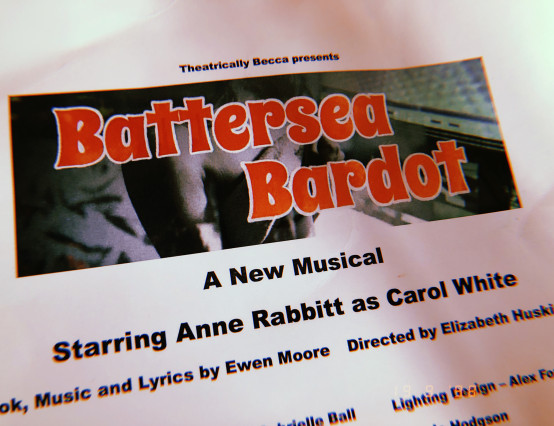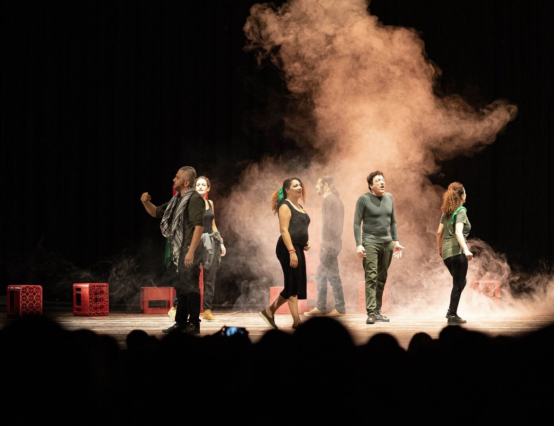'1884' is created by theatre maker Rhianna Ilube and Coney (a social change and art charity). This theatre piece is inspired by the 1884 Berlin Conference. Rhianna Ilube, project director, co-creator, and co-writer of this production offers insights into the motivations, collaborative process, and transformative potential of '1884.'
Drawing inspiration from her time in Berlin, where she witnessed the tireless activism of black communities confronting Germany's colonial past, Ilube shares, "I lived in Berlin for 2 years and was inspired by the political work and awareness-raising of black activists in the city, who were intervening in the city’s landscape to ensure that the legacy of German colonialism was not forgotten or erased. I hadn’t heard about the conference until I moved to Berlin and found that many people back in the UK also hadn’t heard of it. In January 2023, interactive arts charity Coney supported me, along with a group of artists and activists, to create an interactive response piece to the history of the conference, and the start of '1884' was created.” This experience fuelled her determination to ensure that the legacy of German colonialism was neither forgotten nor erased.
The history around this is not talked about or remembered well enough. For some this aspect of history being overlooked, hidden or forgotten, motivates them to do their best to shed light on it. Illube says emphasises how significant shedding light on overlooked moments in history is. "These parts of history are too frequently brushed under the carpet - we like to pretend they didn’t happen. That’s why it’s important to make work that illuminates these events and prevents them slipping out of our collective memory altogether."
So what was The Berlin Conference of 1884–1885?
It stands as a pivotal moment in European history, symbolizing the peak of the continent's quest for African territory, famously termed the Scramble for Africa. As the industrial sectors of nations like Great Britain, France, and Germany flourished in the late 19th century, Africa emerged as a promising source of natural resources and potential markets. Driven by economic interests, European powers embarked on expeditions to Africa, seeking treaties with indigenous peoples to secure land and resources. Belgium's King Leopold II, motivated by personal wealth, dispatched agents to lay claim to vast expanses of central Africa. Even German Chancellor Otto von Bismarck, though initially indifferent to Africa, felt compelled to safeguard Germany's commercial interests on the continent.
This scramble inevitably sparked conflicts among European powers, particularly in regions like West Africa, East Africa, and Central Africa. In response to escalating tensions, Bismarck convened a historic gathering in Berlin in late 1884. Representatives from Great Britain, France, Germany, Portugal, and King Leopold II negotiated their territorial claims, resulting in the formalisation and mapping of Africa's division. However, crucially absent from the conference were the voices and interests of African people themselves. The agreements reached in Berlin disregarded the rights and autonomy of Africa's inhabitants, solidifying European dominance over the continent. European colonisation of Africa did not begin with the Berlin Conference, but the conference legitimised it.
“The UK famously does not like to talk about any of its involvement in colonialism, slavery and extraction. The 1884 conference was one of many ‘landmark’ moments in history that implicated the whole of the European continent in efforts to ‘ramp up’ colonisation, as their diplomats tried to ‘coordinate’ and solidify their hold on the African continent, with devastating consequences to both human life and the environment. The story of the conference was our jumping off point, but the methods of colonial logic and these kinds of ‘closed door’ and ‘forgotten’ conferences that have brutal impacts across generations have been replicated across history to the present day,” Ilube explains.
To unveil this history, it was important to have different experts and perspectives working on the play together. The show has artists, historians and activists whose knowledge interests one another working on the play. “This is a complicated part of history to make work about, so having many different perspectives and skills feeding into the making process felt important,” Ilube says noting the importance of incorporating multiple perspectives. “We ran a series of workshops and R&D weeks in 2023 with lots of different people - from writers to historians, game designers, dramaturgs and activists.”
Using the different ideas and perspectives of the team, the decision was made to have '1884' be interactive with playable elements. "I want people to ‘feel’ the story - not just to learn about it or watch it unfold from afar. I want people to talk to each other, to build relationships through this piece," explains Illube further noting how she wants people to talk about what they’ve experienced and seen. “I want people to talk to each other, to build relationships through this piece. It makes me sad when I see audiences leave an amazing piece of theatre or cinema and nobody is talking to anyone new. I think deep conversations about difficult topics amongst strangers are best ignited when people have just played something together, and that’s what I would like to see happen at the end of each show.”
Ilube articulates her hope for the end of '1884' stating, "I hope the show makes people feel something, and that they are thinking about it long after the show ends!"
The play is live from 17th April till 27th April 2024!!!








0 Comments